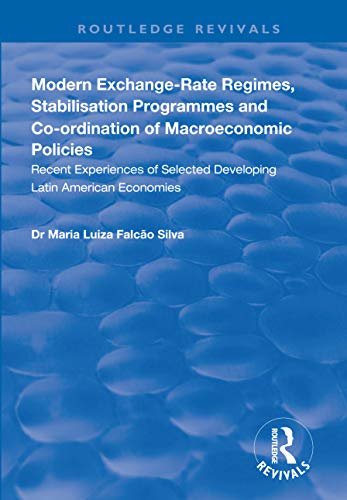
Modern Exchange-rate Regimes, Stabilisation Programmes and Co-ordination of Macroeconomic Policies: Recent Experiences of Selected Developing Latin American ... (Routledge Revivals) (English Edition)
- 作者
- Maria Luiza Falcão Silva
- 语言
- 英语
- 出版社
- Routledge
- 出版日期
- 2018年8月17日
- 纸书页数
- 346页
- 电子书格式
- epub,pdf,mobi,azw3,txt,fb2,djvu
- 文件大小
- 5073 KB
- 下载次数
- 6784
- 更新日期
- 2023-07-29
- 运行环境
- PC/Windows/Linux/Mac/IOS/iPhone/iPad/iBooks/Kindle/Android/安卓/平板
内容简介
Published in 1999, this work analyzes the phenomenon of macroeconomic adjustment, with special emphasis on selected Latin American countries facing stabilization programmes. It provides a historical description of the origins, functioning and collapse of exchange-rate regimes from the international classical gold standard period to modern arrangements. The author supports the argument that systemic asymmetries in the worldwide adjustment mechanism are inherent in the international monetary system. The recent theoretical literature dealing with the rules vs discretion debate and its interaction with the credibility issue is reviewed. This topic is intrinsically related to the dispute over the appropriate role of exchange-rate anchors in disinflation programmes. Against a background of academic dispute between advocates of exchange-rate prescriptions and monetary conceptions, the contrasting views of different theorists regarding the choice of exchange rate regimes are presented and assessed. Finally, a comparative analysis of recent experiments in Argentina, Brazil, Chile and Mexico with exchange-rate based disinflation stabilization programmes is undertaken. The problems that have arisen while establishing new institutional arrangements, such as new currency or a policy rule for monetary base creation, are examined.
Modern Exchange-rate Regimes, Stabilisation Programmes and Co-ordination of Macroeconomic Policies: Recent Experiences of Selected Developing Latin American ... (Routledge Revivals) (English Edition) EPUB, PDF, MOBI, AZW3, TXT, FB2, DjVu, Kindle电子书免费下载。
- Technology, Tradition and the State in Africa (African Ethnographic Studies of the 20th Century Book 33) (English Edition) Jack Goody
- 皮肤活性多肽 丁文锋
- 艺·时光. 猫手账(萌猫主题,可盐可甜) 琳琳
- 葡萄酒工艺学 朴美子、滕刚、李静媛
- 猫解剖学与组织学图谱 李翔、刘志军
- 化工过程及单元操作工艺设计 朱国华、喻红梅
- Lord Byron and Madame de Staël: Born for Opposition (Routledge Revivals) (English Edition) Joanne Wilkes
- The German Social Democratic Party, 1875-1933: From Ghetto to Government (Routledge Library Editions: German History Book 17) (English Edition) W. L. Guttsman
- The Ovimbundu Under Two Sovereignties: A Study of Social Control and Social Change Among a People of Angola (African Ethnographic Studies of the 20th Century Book 22) (English Edition) Adrian C. Edwards
- 办公室の养生经:369个细节呵护你的健康 纪康宝
- Roman Poetry (Routledge Revivals) (English Edition) E.E. Sikes
- 会展设计 张俊竹、苏镜科、尹铂
- West African City: A Study of Tribal Life in Freetown (African Ethnographic Studies of the 20th Century) (English Edition) Michael Banton
- Talking About Supervision: 10 Questions, 10 Analysts = 100 Answers (The International Psychoanalytical Association Psychoanalytic Ideas and Applications Series) (English Edition) Laura E. Rubinstein
- Communication And The Transformation Of Economics: Essays In Information, Public Policy, And Political Economy (Critical Studies in Communication an) (English Edition) Robert E Babe
- 热塑性聚合物改性及其发泡材料 周洪福、王向东
- The Horse in West African History: The Role of the Horse in the Societies of Pre-Colonial West Africa (African Ethnographic Studies of the 20th Century Book 42) (English Edition) Robin Law
- An African Aristocracy: Rank Among the Swazi (African Ethnographic Studies of the 20th Century Book 40) (English Edition) Hilda Kuper
- Work Experience in Secondary Schools (Routledge Revivals) (English Edition) John Eggleston
- The Making Of An Economist (English Edition) Arjo Klamer、David Colander
- 实用服装专业英语(第3版) ("十三五"职业教育部委级规划教材) 张小良
- 给孩子的四季便当(日本花式便当达人、中国妈妈neinei十年育儿便当精华。适合中国胃的正宗日式儿童便当。) neinei
- 考研数学历年真题名师解析.数学一 薛威
- Kazuo Ishiguro: A Routledge Guide (Routledge Guides to Literature) (English Edition) Wai-chew Sim
- 花卉美容养颜使用手册 大医堂
- 用思维导图学英语语法 孟凡飞
- 营养师详解备孕怀孕营养餐——妇幼膳食营养大赛获奖作品解析 中国营养学会妇幼营养分会、汪之顼
- 多孔材料性能与设计 刘培生、崔光、陈靖鹤
- +86 Designer100中国设计红宝书:工业设计 池伟
- Europe and Finland: Defining the Political Identity of Finland in Western Europe (Routledge Revivals) (English Edition) Teija Tiilikainen